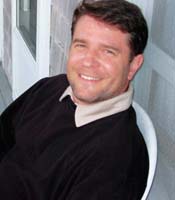 |
 |
| current issue |  | past issues |  | send a letter/news |  | address update |  | advertise |  | about us |  | alumni home |
Features
|
The First UROP Grant Recipients
Where are they now? |
Return to The First UROP Grant Recipients |
Dean T. La Pierre '88
Major: chemical engineering
Job title: Chief Underwriting Officer, Technical Risk Underwriters
Hometown: Andover, Mass.
 Dean T. La Pierre '88 |
What have you been doing since graduation, and what are you doing now?
What have I been doing for the last 24 years in 800 words? I'll try to keep it to 30 words per year. Well, I've been married to my wonderful wife, Lysanne, for almost 17 of those years. Our first couple years were spent living in London, England where I was on assignment for a large insurance company. I travel a good amount with my job, mostly back and forth to Texas where my home office is located, but we still live in Andover, Mass., where we have been for nearly 14 years. We have two beautiful children (twins, Cameron and Nicole) who are 9 years old. Of course, with kids this age, we are deeply entrenched in soccer, baseball, and music and dance schedules. My hobbies include squash, drumming, skiing, and travel with the family.
After graduating from UNH, I continued my education in the field of fire protection engineering at Worcester Polytechnic Institute, where I earned a Certificate of Graduate Study in the field. During those years, I also earned my Engineering in Training (EIT) and my Professional Engineering (PE) License in Fire Protection Engineering.
My entire career (post UNH) has been in the insurance industry, first as a fire protection field engineer for industrial risks, but eventually moving on to the business side of the insurance transaction as an underwriter and underwriting portfolio manager. I specialize in risks that are not easy to place in the standard insurance market and involve complex modeling around catastrophe perils such as hurricane, earthquake, flood, and tornado risk.
In my current position, I act as an underwriting agent for several different insurance entities, including Lloyds of London. Basically, what that means is we evaluate risk based on our own (proprietary) methods and offer insurance products through our partner carriers at a price which we determine to be adequate for taking the (high) risk.
Your UROP project was entitled "Flow Visualization of a Staged Circulating Fluidized Bed Coal Combustor." Can you tell us what you did, and what you got out of it?
At the time of this research, we were trying to clean up the burning process of coal, one of our most abundant carbon-based, natural resources. Our focus was to get coal to burn more to completion—that is, complete the oxidation process fully to carbon dioxide rather than carbon monoxide (as well as some other by nasty by-products of an incomplete burn). What WASN'T on many people's mind at the time was the impacts of "greenhouse" gases in our atmosphere! Coming out of the '70s and '80s, people were still talking about things like "acid rain" (something you don't hear a lot about anymore). People are much more focused on being "carbon-neutral" these days.
Did your research have an impact on what you did later?
Like anything in life, you're never quite sure how what you do at any one time might direct your future. Because of my research, the insurance industry recognized me as someone who might know a little bit about how things burn. That knowledge took me in the direction of fire protection and has led me to a wonderful career in the financial industry. There's no way I could have ever predicted that at the time, but I can look back now and say my life would have been very different had I not chosen to work on this particular project during my upperclass years at UNH.
What do you remember about being on the cover of the Alumnus (assuming you remember it)?
Great story around this subject. I'll try to keep it brief. My high school chemistry teacher was a UNH grad. When I informed him that I was heading to UNH to study chemical engineering, he raised his eye-brow, chuckled a bit, and said "good luck!" I guess you could say I wasn't his greatest student. I have not had the opportunity to speak to him since that day, but I do hear that he STILL tells the story to his class of the young kid who sat in the back row and did not pay attention, but wound up on the cover of his alumni magazine!
Anything else you'd like to add? Any advice for current students?
My advice to current students centers around the mistake my high school chemistry teacher made about me. It's not all about grades. It's about finding what makes you excited to get out of bed every day. For me, I didn't find that until I landed at UNH. Once I did, there was no turning back. I loved my time at UNH because the work didn't feel like work to me—it was something I truly enjoyed. Someone once said if you do what you love, you'll never work a day in your life. I think too many kids these days are following a line of work they think pays well or has some other social appeal, when they need to focus more on what interests them—and then find a way to have it create value for someone in society—the rest will take care of itself.
< Previous recipient Next recipient >
Back to the '88 UROP stories
blog comments powered by Disqus

